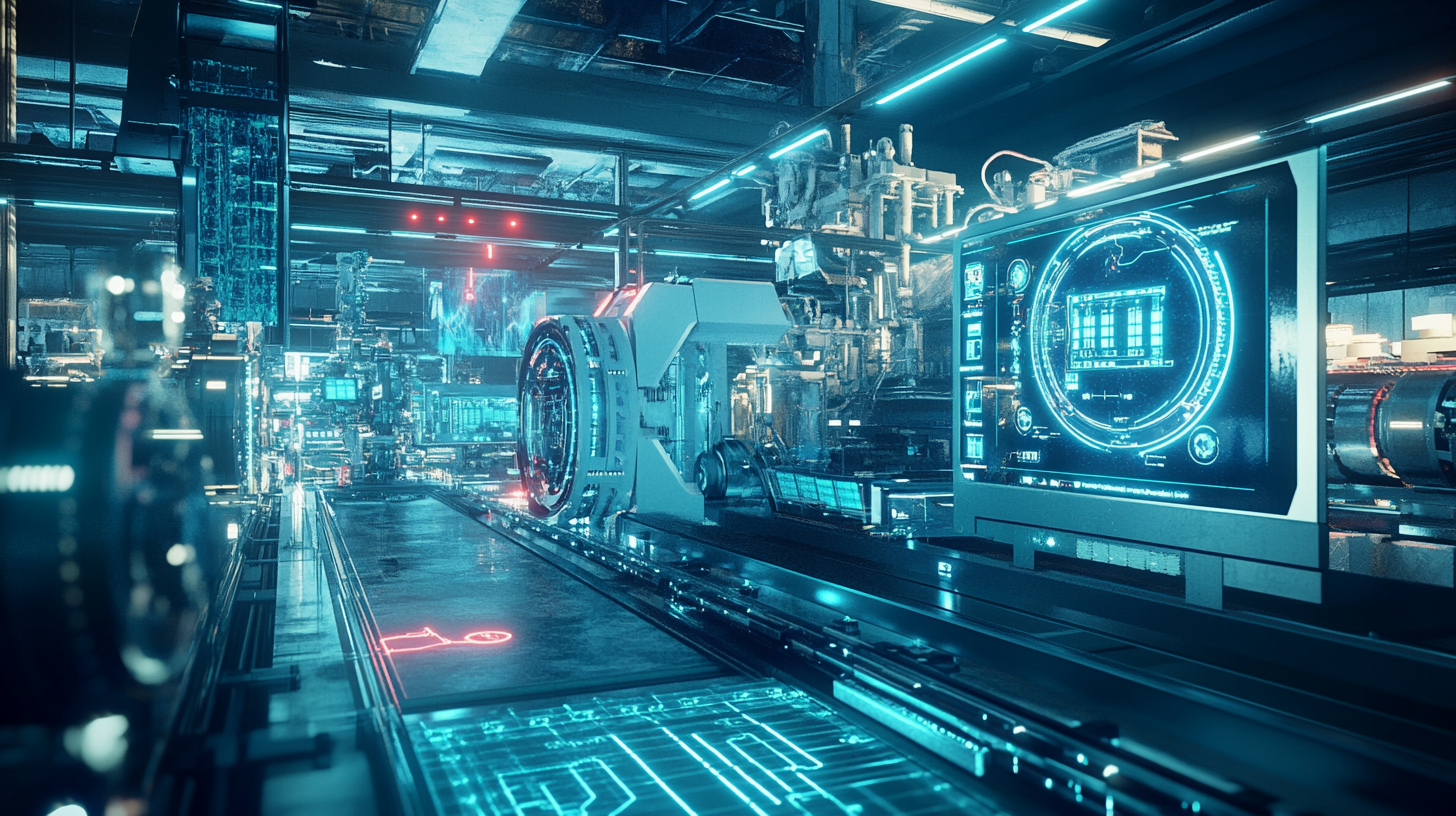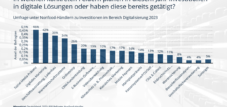Uncertainty when investing in mechanical engineering? What role does digital transformation play in investment security?
Language selection 📢
Published on: December 18, 2024 / update from: December 22, 2024 - Author: Konrad Wolfenstein

Economic security is a decisive factor for investments in mechanical engineering - Image: Xpert.Digital
🚀🔧💡 How does economic uncertainty affect investments in mechanical engineering?
🌐💡 Economic uncertainty is a decisive factor that has a lasting impact on investments in mechanical engineering, a central pillar of German industry. This uncertainty is fueled by a variety of elements such as geopolitical conflicts, rising energy prices, fluctuating financial markets, a shortage of skilled workers and the challenges of digital transformation. Mechanical engineering, traditionally a pioneer in technology and innovation, is faced with far-reaching decisions in times of economic turbulence.
This article highlights the impact of economic uncertainty on mechanical engineering and provides strategies for how companies can address these challenges.
🌍📉❗ Effects of economic uncertainty on investments in mechanical engineering
1. Decline in willingness to invest
One of the most obvious effects of economic uncertainty is the reluctance to invest. Companies that have to plan for the long term in view of unclear general conditions postpone major investments or skip them altogether.
- Planning uncertainty: Volatile energy and raw materials markets as well as uncertain geopolitical developments make planning difficult for companies. Trust in stable framework conditions is a basic prerequisite for the willingness to finance new machines, systems or production capacities.
- Financial burden: Increased interest rates and energy costs are putting companies under additional pressure. Many companies find themselves forced to direct financial resources into maintaining current operations instead of investing in the future.
2. Weakness in demand and declines in production
The uncertainty also affects sales markets, leading to a significant decline in demand:
- In 2024, production in German mechanical engineering fell by 6.8% in the first seven months. At the same time, capacity utilization fell to an average of 79.4%. These figures make it clear that many production facilities are no longer operating at full capacity.
- Customer sectors such as the automotive industry are undergoing massive transformations, for example through the transition to electromobility. This creates a reluctance to purchase new machines.
3. Delay or cancellation of projects
The uncertainty primarily affects projects with high investment volumes and long-term time horizons.
- Research and development (R&D) projects: Given tight budgets, funding for innovations is often canceled or postponed first. This has serious long-term effects on competitiveness.
- Expansion of modern production capacities: Projects aimed at automation, digital networking or sustainability are also often postponed indefinitely.
4. Impact on employment and competitiveness
In addition to the financial consequences, uncertainty also influences companies' personnel policies:
- Short-time work and staff reductions: Companies try to reduce their costs through flexibilities such as short-time work. At the same time, attempts are being made to retain qualified specialists in order to be prepared for the next upswing.
- Competitiveness at risk: Those who do not invest in new technologies and digital transformation run the risk of falling behind internationally. The competition, especially from Asia, is increasingly relying on digitalization and sustainable innovations.
### 🌐⚠️📊 Causes of economic uncertainty
It is important to highlight the main causes of the current economic uncertainty as they provide the context for the impacts mentioned:
- Geopolitical conflicts: The war in Ukraine has severely destabilized energy and raw materials markets. Supply chains have been disrupted and export markets in Eastern Europe have become more uncertain.
- Rising energy costs: The explosion in costs for gas, electricity and other forms of energy has put a massive strain on Germany as a production location.
- Regulatory burdens: Bureaucratic requirements, uncertain tax framework conditions and changing funding structures contribute to planning uncertainty.
- Shortage of skilled workers: Demographic change and the lack of qualified personnel are putting companies under additional pressure.
🌟💻🔧 Solutions and perspectives
Despite the numerous challenges, there are promising strategies to get mechanical engineering back on track for growth.
1. Improvement of the economic policy framework
A stable, reliable economic policy is a cornerstone for returning to an investment-friendly environment. Experts emphasize:
- Less bureaucracy: Reducing regulatory hurdles and simplifying application procedures are necessary to ease the burden on companies.
- Targeted funding programs: Initiatives such as the Growth Opportunities Act can help stimulate investments in research, development and production.
- Energy policy: A long-term, sustainable energy policy can reduce uncertainty about future energy costs.
2. Focus on innovation and digitalization
Companies that actively invest in new technologies create a competitive advantage:
- Digital transformation: The introduction of Industry 4.0 solutions, such as networked production systems or artificial intelligence (AI), can make processes more efficient and enable new business models.
- Sustainable technologies: Investments in environmentally friendly production methods and technologies such as hydrogen can help companies adapt to changing market conditions.
3. Diversification and international partnerships
A broad presence in new markets as well as collaboration with other companies and research institutions offer additional security:
- Open up new markets: Diversification into high-growth regions such as Southeast Asia or Africa can cushion risks from saturated markets.
- Partnerships along the supply chain: Through closer cooperation, supply bottlenecks and uncertainties can be better managed.
4. Flexible business models
Companies that rely on more flexible business models are better equipped to respond to uncertainties:
- Servitization: The transition from pure machine sales to services such as maintenance, consulting and software solutions offers new sources of income.
- Pay-per-use models: Such models allow customers to use machines without having to buy them directly. This creates planning security for both sides.
🌈💪⚙️ A positive outlook: resilience and adaptability
Despite the challenges, mechanical engineering shows impressive resilience. Many companies have already begun to adapt to the new conditions. “German industry has proven time and again in the past that it remains innovative and adaptable even in times of crisis,” is a common mantra among industry experts. Through the combination of government support, entrepreneurial initiative and technological development, there is an opportunity to strengthen mechanical engineering in the long term.
Economic uncertainty undoubtedly has a dampening effect on investment in mechanical engineering. But especially in times of crisis, there are also opportunities. Companies that proactively focus on digitalization, innovation and cooperation can secure competitive advantages. However, the industry also needs reliable economic policy and targeted support in order to fully exploit this potential. The path back to stability and growth requires decisive action – from companies, politicians and society alike.
📣 Similar topics
- 🌍 Mastering economic risks: strategies for mechanical engineering
- ⚙️ Digitalization as an opportunity: How modern technologies create security
- 📉 Declines in production in mechanical engineering: What's behind it?
- 🔋 Rising energy costs: impact on the investment market
- 📈 Investing in times of crisis: strategies for success for the future
- 🚀 Drivers of innovation in mechanical engineering: ways out of uncertainty
- 💡 Geopolitics and mechanical engineering: How companies can react
- 🔧 Shortage of skilled workers in mechanical engineering: challenges and solutions
- 🌐 Opening up international markets: focus on diversification
- 📊 Research, development and digitalization: key to competitiveness
#️⃣ Hashtags: #Mechanical Engineering #EconomicUncertainty #Digitalization #Innovation #Energy Costs
🔄📈 B2B trading platforms support – strategic planning and support for exports and the global economy with Xpert.Digital 💡
Business-to-business (B2B) trading platforms have become a critical part of global trade dynamics and thus a driving force for exports and global economic development. These platforms offer significant benefits to companies of all sizes, particularly SMEs – small and medium-sized businesses – which are often considered the backbone of the German economy. In a world where digital technologies are becoming increasingly prominent, the ability to adapt and integrate is crucial to success in global competition.
More about it here:
🌐 What role does digital transformation play in investment security in mechanical engineering?
💡💼 Digital transformation has developed into an indispensable driver for ensuring investment security in mechanical engineering. It not only offers the opportunity to make processes more efficient and establish new business models, but also helps companies to protect themselves against risks and challenges in the long term. In an industry characterized by pressure to innovate and global competition, digitalization is a fundamental prerequisite for remaining competitive and ensuring sustainable growth.
🚀 Increased efficiency and productivity gains through digitalization ⚙️
A central aspect of digital transformation is the optimization of production processes. By using modern technologies such as the Internet of Things (IoT), artificial intelligence (AI) and big data, companies can significantly increase the efficiency of their systems. Predictive maintenance is an example of this: This technology uses sensor data and algorithms to monitor machine conditions in real time and identify maintenance needs at an early stage. The result is reduced downtime and lower maintenance costs. At the same time, overall equipment effectiveness (OEE) is improved because potential failures are addressed before they become major problems.
Another advantage of digitalization is the automation of recurring processes. Robots and automated production lines can not only increase productivity, but also reduce error rates and ensure consistently high product quality. This is crucial to remain competitive in a globalized market.
🌟 Opening up new business models and markets 📊
Digital transformation opens up completely new perspectives for companies in mechanical engineering. By introducing data-based business models, mechanical engineers can generate additional added value. Technologies such as digital twins – virtual images of physical machines – enable precise simulation and optimization of production processes. Companies can not only sell machines to their customers, but also offer accompanying services such as remote monitoring or performance optimization.
An example of this is the “Pay-Per-Fer” model, in which customers only pay for the actual use of the machines. This offers a flexible and cost -efficient alternative to traditional purchase. Such innovative business models promote long -term customer relationships and create new sources of income.
In addition, digitalization enables entry into new markets. Through data-driven insights into customer needs, companies can develop tailor-made products and respond more quickly to changing market requirements.
🤝 Flexibility and adaptability 🛠️
The ability to react quickly to market changes and individual customer requests is a decisive competitive advantage. Digital technologies make companies more agile and flexible. Production processes can be flexibly adapted using modular plant concepts and software-controlled control systems to serve smaller batch sizes or customer-specific requirements.
In addition, technologies such as augmented reality (AR) and virtual reality (VR) are playing a growing role in mechanical engineering. Not only do they facilitate the development of new products, but they also provide support for maintenance and training of employees. Virtual prototypes can be tested faster and more cost-effectively, shortening development times and reducing the time to market of new products.
🔍 Minimize risk and improve transparency 🔐
The digital integration of data from the entire value chain increases transparency and minimizes risks. Real-time data from machines and production systems enable better decision-making and faster response times in the event of disruptions. Companies can monitor processes better and identify possible bottlenecks or sources of errors at an early stage.
Another advantage is the use of digital twins, which enable companies to simulate complex production processes and products before production. This allows development times to be shortened, production errors to be avoided and costs ultimately reduced.
🌱 Sustainability and resource efficiency ♻️
Sustainability is not only a social megatrend, but also an important factor for investment security. Digitalization makes it possible to use resources more efficiently and thus reduce costs and achieve environmental goals. Smart energy management systems can optimize machine energy consumption, while data-based analytics help minimize material waste.
One example is the use of AI to optimize production processes. AI algorithms can recognize patterns in large amounts of data and make recommendations for resource-efficient production. This not only helps reduce costs, but also improves the company's ecological balance.
⚠️ Challenges of digital transformation 💻
Despite its numerous advantages, digital transformation also presents challenges that mechanical engineering companies must overcome. These include the high investment costs for introducing new technologies as well as the need to modernize existing IT infrastructures. In addition, employees must be trained and internal resistance must be overcome in order to successfully implement the digital transformation.
Another key issue is cybersecurity. The increasing networking of machines and systems increases the vulnerability to cyber attacks. Companies must therefore develop comprehensive security strategies to protect their sensitive data and systems. This requires investing in modern security technologies and raising employee awareness of potential risks.
📌 Strategic importance and success factors 🗂️
In order for digital transformation to contribute to investment security in the long term, companies need a clear strategy. It is not enough to introduce individual technologies - rather, they must be integrated into a holistic concept. Important success factors are:
- Clear objectives: Companies should define what specific goals they want to achieve with digitalization.
- Employee qualification: Training the workforce is essential to promote the acceptance and effective use of digital technologies.
- Partnerships: Collaborations with technology providers and research institutes can accelerate the implementation of new solutions.
- Iterative approach: Instead of digitizing everything at once, companies should proceed step by step and start pilot projects in order to achieve initial success and minimize risks.
Digital transformation is a key factor for investment security in mechanical engineering. It enables companies to work more efficiently, develop innovative business models and adapt flexibly to market changes. At the same time, it offers solutions to use resources sustainably and minimize risks. Despite the challenges it brings with it, digitalization is not an option, but a necessity in order to be successful in the long term in global competition.
Companies that consistently exploit the opportunities presented by digital transformation will not only increase their competitiveness, but also create a solid foundation for future investments.
📣 Similar topics
- 📣 Digital transformation in mechanical engineering: A key to securing the future
- 🚀 Increasing efficiency with IoT, AI and big data
- 🔍 Transparency through digital twins and real-time data
- 🌍 Sustainability: Digitalization as an environmental driver for mechanical engineering
- 🤖 Automation and flexibility in production processes thanks to digitalization
- 🔒 Cybersecurity: The weak point in connecting machines
- 💡 New business models: pay-per-use and data-driven services
- 📊 Data integration to minimize operational risks
- ❗ Challenges and success factors of digital transformation
- 🏭 The competitive mechanical engineering market and the power of digitalization
#️⃣ Hashtags: #DigitalTransformation #Mechanical Engineering #Increasing Efficiency #Sustainability #Industrie4punkt0
We are there for you - advice - planning - implementation - project management
☑️ SME support in strategy, consulting, planning and implementation
☑️ Creation or realignment of the digital strategy and digitalization
☑️ Expansion and optimization of international sales processes
☑️ Global & Digital B2B trading platforms
☑️ Pioneer Business Development
I would be happy to serve as your personal advisor.
You can contact me by filling out the contact form below or simply call me on +49 89 89 674 804 (Munich) .
I'm looking forward to our joint project.
Xpert.Digital - Konrad Wolfenstein
Xpert.Digital is a hub for industry with a focus on digitalization, mechanical engineering, logistics/intralogistics and photovoltaics.
With our 360° business development solution, we support well-known companies from new business to after sales.
Market intelligence, smarketing, marketing automation, content development, PR, mail campaigns, personalized social media and lead nurturing are part of our digital tools.
You can find out more at: www.xpert.digital - www.xpert.solar - www.xpert.plus


























